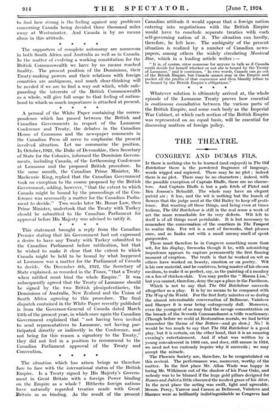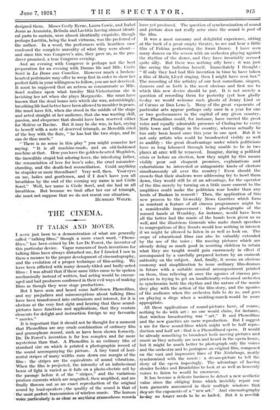THE THEATRE.
CONGREVE. AND DUMAS FILS.
IF there is nothing else to be learned (and enjoyed) in The Old Batchelour there is the powdered fragrance of language, words wigged and rapiered. There may be no plot ; indeed there is no plot.. There may be no characters ; indeed, with the possible exception of Captain Bluffe, there are no charac- ters. And Captain Bluffe is but a pale fetch of Pistol and Ben Jonson's Bobadill. The whole may have an elegant putrid air. ; it has, and the wit is nothing but the bunch of flowers that the judge used at the Old Bailey to keep off pesti- lence. But wanting all these things, and being even at times tedious, The Old Batchelour is still in the real sense a work of art the more remarkable for its very defects. Wit left to itself is of all things most perishable. It is but necessary to remember the -cofiversi.tion of the courtiers. in. The. Tempest to realize this. For wit is a sort of fireworks, that pleases once, and so fizzles out with a small uneasy smell of spent gunpowder.
There must therefore be in Congreve something more than wit, for his display, fireworks though it be, with astonishing impudence appears to capture permanently the first flaming moment of eruption. The truth is that he worked on wit as others have worked on beauty, emotion or on poetry. Wit is his raw material, and he contrives, being master of his chosen medium, to make it as perfect, say, as the painting of .a monkey on a fan of chicken-skin. You may prefer the " Monna but you cannot-therefore, deny the ape a place in the Pantheon,
Which is not to say that The Old Batchelour succeeds altogether as a play. It is by no means to be compared with The Way of the World. For the first forty minutes or so during the almost interminable conversation of Bellmour, Vainlove and Sharper it is near being outrageously dull. Moreover, even the youngest of us may find the savage concentration on the breach of the Seventh Commandment -a trifle reactionary,. (Though before we scold at Restoration morals, we had better remember the theme of Our Betters—and go slow.) No ! it would be too much to say that The Old Batchelour is a good play, but it is certain, on the other hand, that it is an amazing evening's entertainment. And if what was written by a young convalescent in 1693 can, and does, still amuse in 1924, we need not too curiously inquire why it succeeds ; we may accept the miracle.
The Phoenix Society are, therefore, to be congratulated on this revival. The performance was, moreover, worthy of the matter. In the first place Mr. Allan Wade was happy in luring Mr. Wilkinson out of the shadow of his Four Oaks, and nobody was to be blamed if the huge gold pillars designed for Romeo and Juliet a little obscured the modest grace of his decor. In the next place the acting was swift, light and agreeable. Messrs. Percy, Yarrow and Carson as Bellmour, Vainlove and Sharper were as brilliantly indistinguishable as Congreve had
designed them. Misses Cecily Byrne, Laura Cowie, and Isabel Jeans as Araminta, Belinda and Laetitia having almost identi- cal parts to sustain, were almost identically exquisite, though perhaps Laetitia, being the least virtuous, was the preferred of the author. In a word, the performers with heartless ease confessed the complete unreality of what they were about— and since this was Congreve's aim, they gave us, as the pro- ducer promised, a true Congreve evening.
And an evening with Congreve is perhaps not the best preparation for an evening with Dumas fils and Mlle. Cecile Sorel in La Dame aux Camilias. However much a broken- hearted poitrinaire may offer to weep first in order to show her perfect faith in your willingness to follow, you are not deceived. It must be supposed that an actress so consummate as Mlle. Sorel realizes upon what tawdry Mid-Victorianism she is lavishing her art when she plays Marguerite. She must have known that the dead bones into which she was, astonishingly, breathing life had better have been allowed to moulder in peace. She must have felt, when she stood in the middle of the stage and acted straight at her audience, that she was wasting skill, passion, and eloquence that should have been reserved either for Moliere or Racine. But it may be she was, in fact, crying to herself with a note of deserved triumph, as Meredith cried of the boy with the flute, " he has but the two stops, and he can do thus much."
" There is no sense in this play " you might conceive her saying. " It is all machine-made, and an old-fashioned machine at that. Here you have the golden-hearted Magdalen, the incredibly stupid but adoring lover, the interfering father, the renunciation of love for love's sake, the cruel misunder- standing, and the death-bed reconciliation. Could anything be stupider or more threadbare? Very well, then. Your eyes on me, ladies and gentlemen, and if I don't have you all breathless by the end of the evening my name is not Cecile Sorel." Well, her name is Cecile Sorel, and she had us all breathless. But because we trail after her car of triumph, she must not suppose that we do not resent our situation.
HUMBERT WOLFE.











































 Previous page
Previous page